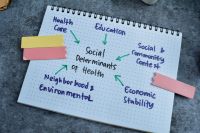
Study Finds Rates of Anxiety and Depression Still Higher Compared to Pre-COVID
September 30, 2024
COVID-19 had significant negative impacts on mental health, but less is known about how wellbeing has fared since the height of the pandemic. In a recent analysis, researchers compared rates of anxiety and depression among U.S. adults before, during, and after the pandemic using baseline data from the National Health Interview Survey and COVID-era data from the CDC Household Pulse Survey. Although rates of anxiety or depression improved from 37.6% to 29.5% between the first year of the pandemic and the following “COVID recovery period,” levels remain higher than the pre-pandemic baseline of 10.8%. To learn more, see the study in The International Journal of Environmental Research and Public Health.

Learning More About Clinical Experiences Related to Schizophrenia
September 23, 2024
The U.S. Mental and Substance Use Disorders Prevalence Study (MDPS) was a landmark research effort designed to provide updated prevalence estimates for mental health conditions – including schizophrenia spectrum conditions – in U.S. adults. In a recent study, researchers used MDPS data to better understand characteristics associated with schizophrenia spectrum conditions. Major depressive episodes, alcohol use disorder and cannabis use disorder were common co-occurring conditions for people with schizophrenia spectrum conditions. Critically, just 26% of people with schizophrenia spectrum conditions received the bare minimum of adequate treatment in the past year. To learn more, see the study in Psychiatric Services.

Spiritual and Religious Practices of Mental Health Service Users
September 1, 2024
Spirituality and religion can play an important role in mental health, affecting how people cope with symptoms and receive support. In a survey of nearly 1,000 U.S. adults receiving mental health services, more than 70% identified as moderately/very spiritual, 56% as moderately/very religious, and 50% as both. Notably, most respondents indicated that their religious/spiritual practices have a positive impact on their mental health. However, some respondents indicated a more negative experience with elements of religion/spirituality and mental health, illuminating the complexities of the relationship. To learn more, see the study in Social Work Research. And for resources on navigating mental health through your own spiritual or religious lens, see NAMI FaithNet.

Evaluating an Online Mental Health Training Curriculum for School Nurses
August 15, 2024
School nurses represent a critical point for youth to be engaged in mental health support and education, but they often do not receive enough relevant mental health training. In a recent study, researchers investigated the usefulness of a free, online mental health training program known as the Mental Health Training Intervention for Health Providers in Schools. Participants included more than 1,000 registered nurses and nurse practitioners who completed at least one training module. Overall, participants reported that the intervention was feasible, accessible, and helped them feel better prepared to support student mental health. To learn more, see the study in The Journal of School Nursing.

The Role of Sociodemographic Factors and the Social Determinants of Health in Risk for Depression
August 5, 2024
In a recent analysis of data from the All of Us Research Program, researchers explored how sociodemographic factors and the social determinants of health (SDoH) may affect risk for major depressive disorder (MDD), as well as how the interaction of sociodemographic factors with SDoH may impact risk for MDD. Findings included increased risk for MDD among cisgender heterosexual women, LGBTQIA2+ individuals, and people experiencing food insecurity. Interaction effects were less clear, illustrating the complexity in designing studies to understand relationships between identity and social determinants of health among marginalized populations. To learn more, see the study in PLOS Mental Health.

Recognizing Disparities in Mental Health Care among Individuals with Chronic Pain
July 30, 2024
Despite the prevalence of anxiety and depression symptoms among individuals with chronic pain, this population may not have adequate access to mental health treatment. In an analysis of data from the 2019 National Health Interview Survey, researchers identified three mental health disparities associated with having chronic pain: more often needing mental health treatment, less often using mental health services in the past year, and less often experiencing remission of anxiety and/or depression despite receiving treatment in the past year. Recognizing the unique needs of this underserved population is critical to remove barriers to effective mental health care. To learn more, the study in PAIN.

Medical Debt and Care-seeking for Mental Health Conditions
July 17, 2024
Cost is consistently identified as a reason that people do not seek mental health care, and a new study investigates the relationship between medical debt and individuals’ medical history and care-seeking behaviors. Based on data from the 2022 National Health Interview Survey, medical debt was more common for adults who have ever been diagnosed with anxiety or depression, as well as those who are currently experiencing symptoms, compared to adults without either mental health condition. Critically, medical debt was associated with delaying or going without mental health care for both lifetime and current anxiety and depression groups. To learn more, see the study in JAMA.

Paternal/Partner Mental Health Surrounding Childbirth
June 24, 2024
Mental health surrounding childbirth is well-researched among women, but less is known about mental health symptoms among men/non-birthing parents. In a recent meta-review, researchers identified six previous reviews of paternal/partner mental health screening tools, including 167 studies total. The authors suggest that while a growth in research related to paternal/partner mental health over time is encouraging, further research is needed to develop and test screening tools that are both specific to the unique experience of men/non-birthing partners and reflective of cultural differences in the role of a partner surrounding childbirth. To learn more, see the study in Frontiers in Public Health.

Qualitative Research Explores Unique Relationships with Mental Health among Home Health Aides
June 6, 2024
In this qualitative research study, researchers worked with a small group of home health aides and attendants (HHAs) in New York City to understand their perspectives on mental health and well-being. Researchers identified multiple themes across participants, including the influence of cultural beliefs, the type of relationships HHAs have with their patients, and the role of systemic factors such as organizational issues and the COVID-19 pandemic. Participants also voiced support for educational courses on wellness and opportunities for peer coaching to address challenges related to mental health. To learn more, see the study in JAMA.

Comfort with Talking to Others about Mental Health
May 2, 2024
A new survey conducted by Pew Research Center illuminates how comfortable Americans are in discussing their mental health with different types of people. Researchers surveyed more than 10,000 U.S. adults in February 2024, and found that half or more are comfortable talking about their mental health with a close friend (57%), immediate family member (52%) or mental health therapist (50%). Americans overall are less comfortable having these conversations with a religious or spiritual leader (31%), and much less comfortable with a colleague (19%) or neighbor (11%). To learn more, see the survey results from Pew Research Center.

